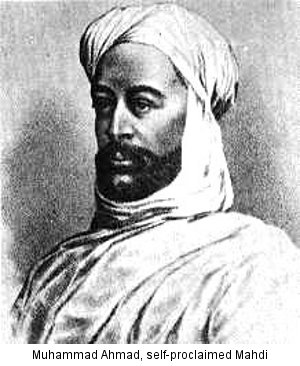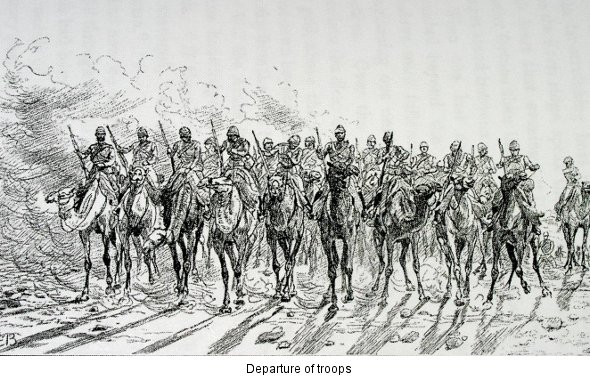Journal Volume 6 2010
Sir William F. Butler (continued/10)
The plan was that the boats would have a voyageur fore and aft with 8 soldiers pulling the oars. At the cataracts the soldiers would go ashore and pull or manhandle the boats with the voyageurs on board to steer. The distances to be covered were:
-
-
220 miles: Alexandria to Assiut by rail
-
540 miles: Assiut to Wadi Halfa by river steamer
-
860 miles: Wadi Halfa to Khartoum by river boat
-
There was a possibility that the last leg could be reduced to a 180-mile short cut across the loop of the Nile from Korti to Metemna. To prepare for this possibility Wolseley formed a Camel Corps of Guardees. Later there was to be a debate as to whether the split of the expedition into a ‘River Force’ and a ‘Camel Corps’ was to cause the fatal delay which brought about the failure to rescue Gordon.
By mid November the force had only reached Wadi Halfa. They had been delayed by bickering between staff officers, many of whom believed that the River Force was the wrong option. They constantly gave priority to supplies and equipment for the land force.
Meantime Wolseley received a message from Gordon to the effect that he could hold out for 40 days more. By then he was running out of ammunition; food rations were exhausted and the garrison and population were reduced to eating domestic animals, even rats. No man other than Gordon could have held out for ten months against overwhelming odds and provided leadership to a garrison which was increasingly reduced by sickness and starvation. If he were to be saved Wolseley needed to reach Khartoum by end December at the latest.
In fact by early January his leisurely overland progress had only reached Korti 400 miles from Khartoum – the jumping off point for the overland dash to Metemmeh where there were river steamers to transport the vanguard up the Nile for the last 100 miles to Khartoum. There seemed no sense of urgency to force a way through to Khartoum by the land route. Meantime Butler was fuming that he had been left with only a token force of soldiers and no support to keep his unit moving upriver.
 On 18th January when the Land force reached Abu Klea, a force of 10,000 Mahdists was lying in wait for them. There were 1600 men in the British contingent plus some artillery and a naval detachment. The British formed a square which was attacked by columns of native soldiers, each under an emir who came forward into a storm of rifle fire indifferent to their losses. The torrent of Arabs broke through but the British managed to repair their line but not before they had lost 65 killed and 61 wounded. It was in this action that Colonel Fred Burnaby was killed. About 800 of the Mahdists lost their lives.
On 18th January when the Land force reached Abu Klea, a force of 10,000 Mahdists was lying in wait for them. There were 1600 men in the British contingent plus some artillery and a naval detachment. The British formed a square which was attacked by columns of native soldiers, each under an emir who came forward into a storm of rifle fire indifferent to their losses. The torrent of Arabs broke through but the British managed to repair their line but not before they had lost 65 killed and 61 wounded. It was in this action that Colonel Fred Burnaby was killed. About 800 of the Mahdists lost their lives.
A second action followed a few days later at Abu Kru where the Mahdists might have destroyed the British force but their courage was their undoing. Instead of holding off, pinning the soldiers down with firearms, they charged into the wall of rifle fire and suffered huge losses. After this the way to Metemmeh was open which they entered on 19th January. They found four paddle steamers which Gordon had dispatched from Khartoum. Unfortunately the column wasted time resting and repairing the steamers. Before they reached Khartoum the Mahdist army finally broke through into the city on January 26th 1885 and Gordon was speared to death. The whole purpose of the expedition was now futile.
Butler only heard of Gordon’s death three weeks after the event. He was still at Korti, convinced that the River Force could still achieve the advance to Khartoum by the longer route but the order from Wolseley to start came too late. At first there was some discussion of a punishment expedition against the Mahdi but the soldiers were exhausted and the Arabs continuing to increase in numbers. The decision to evacuate Sudan had been made for them.
Butler’s verdict on the episode was to bitterly regret the failure to rescue Gordon whom he admired above all men but he recognized that his hero had died a soldier’s death and done his duty to the end. In later years he was to write a biography of Gordon extolling the great man’s achievements in China and in Africa.
Butler remained in the Sudan for 18 months until July 1886 during which time he fought numerous small engagements to cover the orderly withdrawal of the British and Egyptian forces, protecting the communications north of Wadi Halfa. His wife joined him for part of this time and recorded in pen and ink sketches the scenes of some of his military activities. In July he was invalided home and placed on half pay, mainly because his dispatches criticizing the authorities conduct were bitterly resented in the War Office. However fearing that public opinion would become aware of the shabby treatment meted out to him, the War Office had him gazetted a Brigadier-General and awarded a K.C.B.

He took his young family to Brittany where he wrote and relaxed in their company for the next 18 months. His sojourn in Brittany was to be disturbed by an unsavoury divorce case in which he was maliciously implicated.


